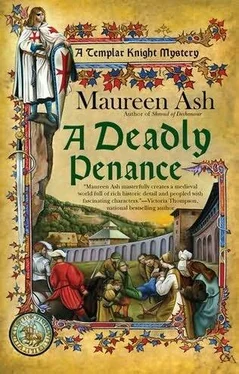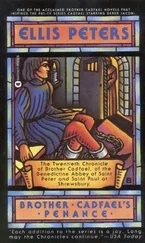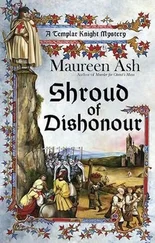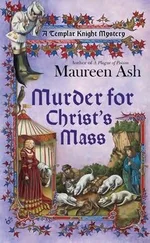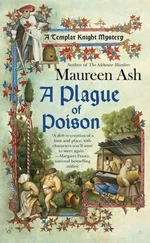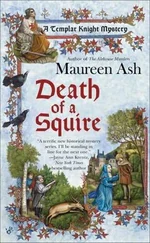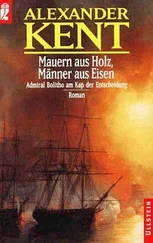MAureen Ash - A Deadly Penance
Здесь есть возможность читать онлайн «MAureen Ash - A Deadly Penance» весь текст электронной книги совершенно бесплатно (целиком полную версию без сокращений). В некоторых случаях можно слушать аудио, скачать через торрент в формате fb2 и присутствует краткое содержание. Жанр: Исторический детектив, на английском языке. Описание произведения, (предисловие) а так же отзывы посетителей доступны на портале библиотеки ЛибКат.
- Название:A Deadly Penance
- Автор:
- Жанр:
- Год:неизвестен
- ISBN:нет данных
- Рейтинг книги:5 / 5. Голосов: 1
-
Избранное:Добавить в избранное
- Отзывы:
-
Ваша оценка:
- 100
- 1
- 2
- 3
- 4
- 5
A Deadly Penance: краткое содержание, описание и аннотация
Предлагаем к чтению аннотацию, описание, краткое содержание или предисловие (зависит от того, что написал сам автор книги «A Deadly Penance»). Если вы не нашли необходимую информацию о книге — напишите в комментариях, мы постараемся отыскать её.
A Deadly Penance — читать онлайн бесплатно полную книгу (весь текст) целиком
Ниже представлен текст книги, разбитый по страницам. Система сохранения места последней прочитанной страницы, позволяет с удобством читать онлайн бесплатно книгу «A Deadly Penance», без необходимости каждый раз заново искать на чём Вы остановились. Поставьте закладку, и сможете в любой момент перейти на страницу, на которой закончили чтение.
Интервал:
Закладка:
“Was it a gold ring with an engraving on the inner side of a crescent moon encircling a star?” Richard asked.
“Yes, that’s the one. After I read the letter, and had given much soul-searching thought to the matter, I showed the letter to Aubrey and gave him the ring. My main reason for doing so was that he should know his father had not been, as he had been led to believe, of common stock, but had most likely been a friend of my brother’s and therefore a man of knight’s rank.”
“Did your brother name the father?” Bascot asked.
“No. He said in the letter that it was of no consequence; the lie had been told to protect Aubrey’s mother. She had been a maid of Winchester, Lionel wrote, and a woman of good repute, who was the daughter of a merchant and promised in marriage to a burgess of Lincoln. Since her future husband could not be expected to accept her as a bride if he discovered she had borne a child sired by another man, it was decided to keep the matter secret and my brother was asked to take her to a convent where she could be immured until the birthing. After that event, he said, it had been requested of him that he find a good home for the babe, so the woman could go to her betrothal as though she were a virgo intacta. As far as I can tell, all went as planned. Lionel brought the child to me and the mother married the merchant. Since I had believed the boy to be my own kin, even though of bastard stock, I contrived to have him educated and cared for as best I could. It was a shock to learn, so many years later, that my reason for doing so was fallacious.”
“Did your brother never ask after the child’s progress?” Nicolaa asked.
“Lionel was seldom in England during the years after he left Aubrey with me. Lionheart gave him a small fief in Aquitaine and it was there that he spent most of his time, and where he died, the manner of it told to me in a missive sent by the priest who was his confessor. I sometimes received a letter from Lionel to let me know how he fared, but that is all. But his news dealt mostly with his own activities or, after Lionheart died, with the political situation across the Narrow Sea, and made no mention of the boy. I must admit, to my shame, that I gave little thought to Aubrey myself until I found the letter I have brought you. His tutor was one I had hired to school some of the children of my upper servants and I left him to the cleric’s care, and that of my steward. On the rare occasions I spoke to him, he seemed a personable lad, and intelligent.”
Richard leaned back in his chair. “As interesting as all this is, Wharton, I cannot see what connection it has to his murder.”
“The tale, in itself, would have none,” Wharton said. “It is what Aubrey made of it that has brought me here. I wish now that I had kept the secret hidden from him. He made much of the ring and the mention of Winchester in the letter, for around the date of his conception, which would have been during the month of April, 1176, the late King Richard, then a prince, was in the town at a meeting with his father, King Henry.”
Wharton paused to allow everyone to cast their minds back to that year and remember how King Henry had, in response to the constant plotting of rebellion by his wife and recalcitrant sons, imprisoned his queen, Eleanor, at Salisbury in 1174. Although she had been kept in close confinement by her gaolers, her incarceration was not unduly harsh and, two years later, in 1176-the year of which Wharton was speaking-she had been taken to Winchester at Eastertide for a reconciliatory meeting between the son and his father. Prince Richard had been amenable to the conclave, for he hoped, with his mother’s help, to persuade his father to give him assistance in controlling the rebellious nobles in his duchy of Aquitaine, a part of the territory Eleanor had inherited from her own father and which she had persuaded Henry to cede to their son a few years before.
Once assured that all of his listeners recalled the circumstances of which he was speaking, Wharton continued his tale. “Aubrey cobbled the information together in a most unlikely fashion. He said the coincidence of the prince being in Winchester at the time of his conception, coupled with the fact that my brother had been in his service, could lead to no other conclusion than that his father had been Lionheart himself. The ring, he said, confirmed this because it bore a design that was often used on his badge, both while he was a prince and when he later became king.”
“A rather dramatic summation,” Richard opined sceptically. “The ring could have belonged to any of the nobles in Lionheart’s retinue. Even when a prince, he was known to be generous in rewarding his followers, and remained so after he took the throne. To give such a token would not have been unusual. And your brother’s mention of loyalty could have meant that due to friendship with a fellow knight.”
“That is exactly what I tried to explain to Aubrey,” Wharton agreed eagerly, “but he would not listen. Although he was intelligent, he could be rather inflexible in his opinions.”
Alinor gave a snort of derision. “You understate it, Wharton. Tercel was smug and self-opinionated.” The knight looked abashed and made no comment in response.
“How long was your brother in Lionheart’s service?” Richard asked.
“Almost three years,” Wharton replied, “and had accompanied the prince to Winchester in 1176. I was surprised to see my brother when he turned up with Aubrey, for I had believed him to have returned to Aquitaine, but he said he had been sent to England with messages for Queen Eleanor and was due to return to his duties across the Narrow Sea, hence the urgent need for my help.”
The knight leaned forward now, his reticence forgotten. “When I saw how Aubrey reacted to the information contained in Lionel’s letter, I tried to dissuade him from his notion. I told him that his father was most likely another knight, like my brother, in Lionheart’s service, one who was my brother’s friend and had asked for his help, but Aubrey would have none of it. His father must have been the prince, he said, of that he was certain, and the only way he could prove it was to find the woman who had been his mother. When I taxed him with how he proposed to do that, he said he would go to Lincoln as soon as opportunity provided and seek her out. I thought he would have no chance to do so while in Dickon’s service and would soon forget his ridiculous notion, but I did not foresee that Lady Petronille would subsequently decide to travel to Lincoln and that Aubrey would be included in her retinue.”
“He practically begged my father to come with us,” Alinor said angrily. “Now we know the reason why.”
Richard shrugged. “Well, I cannot see what Tercel hoped to gain by proving the prince was his sire or how he would be considered a threat if he managed to do so. Lionheart acknowledged a couple of bastard sons, both of them in lands he held on the continent, but only one of them, Philip of Cognac, benefitted by his acknowledgement, for he was given an heiress to wed. Even so, all Cognac received on the death of his father was one mark, which King John, in accordance with his brother’s will, awarded him. Tercel could hardly have expected any financial reward.”
“I think his interest was more in confirming that he was of royal blood than in the expectation of material gain,” Wharton said. “He became obsessed with the idea and believed it would enhance his stature in society. That aim, even though self-serving, would have been innocent enough, but in order to achieve his goal, he would need
…” Wharton, reluctant to speak aloud the implication, let his words trail off.
“To discover the identity of his mother and, in so doing, reveal the fact that she had borne an illegitimate child before her marriage,” Bascot finished for him.
Читать дальшеИнтервал:
Закладка:
Похожие книги на «A Deadly Penance»
Представляем Вашему вниманию похожие книги на «A Deadly Penance» списком для выбора. Мы отобрали схожую по названию и смыслу литературу в надежде предоставить читателям больше вариантов отыскать новые, интересные, ещё непрочитанные произведения.
Обсуждение, отзывы о книге «A Deadly Penance» и просто собственные мнения читателей. Оставьте ваши комментарии, напишите, что Вы думаете о произведении, его смысле или главных героях. Укажите что конкретно понравилось, а что нет, и почему Вы так считаете.
